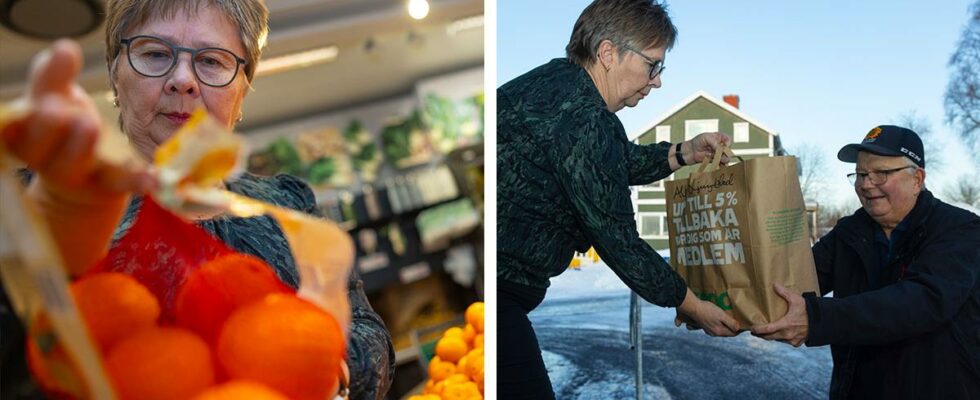unsaveSave
expand-left
full screen Iris Karlsson in the grocery store. Photo: Patrick Trägårdh
The municipality stopped buying food for the elderly.
Now the pensioners save the dinner.
– You can’t just sit at home and file your nails – it’s boring, says Iris Karlsson, 68.
She is one of the dozen pensioners who brighten the lives of the elderly and disabled in Lövånger, Burträsk, Jörn, Ursviken and Skellefteå. Those who cannot manage to get to a grocery store.
It is the local sports association LUAIK, Lövånger-Uttersjöbäcken general sports club, which has the direct responsibility for the action and also those who engaged the gray panthers.
– We are hired as volunteers, if you want, you get SEK 250 – minus tax. Once a week, three volunteers are in the store in the morning and collect goods for the pensioners. Then there are four other pensioners who take it in turns to deliver the goods to them, says Iris Karlsson.
In practice, this means that the pensioners pack goods once a month. And no, this is not about any newness – in October, LUAIK has managed the service in Skellefteå municipality for 20 years.
– We were asked in the sports association by the store manager if we could take it upon ourselves to deliver goods once a week. Then he asked us to take over the entire chain, to pack the goods and drive them out, says Majken Bodén, 65, former clerk at LUAIK.
expand-left
full screen Iris collects goods for delivery. Photo: Patrick Trägårdh
At first, the sports association managed both the collection of goods and the delivery, in recent years the pensioners have managed it.
– But the municipality pays out both state and municipal grants to the sports association and the association reports to the municipality monthly, she says.
Iris Karlsson has been involved for the past two or three years, since she retired from her job as a preschool teacher.
– But before that I worked in the shop, straight after high school. I actually helped start the store once upon a time, she says.
– In the past, the pensioners called the store and we wrote down an action note. We collected the stuff and sent it with a receipt plus change in a taxi.
Today, no notes are handled, cashless purchases apply, and the shopping lists are handled by the home service.
– You have a card in the store, with a code. The cards are kept locked up, so they can be taken out in the morning, says Iris Karlsson.
expand-left
full screen Iris Karlsson hands over the goods to today’s driver Lennart Wikström, 71, who drives them out to the elderly and disabled in the communities. Photo: Patrick Trägårdh
This week it was her turn to collect food bags.
– We start at seven o’clock and it usually takes an hour and a half before we are done.
How long are you going to work like this?
– Yes, but like until I fall off a stick’ … as long as I can bear it, I think.
